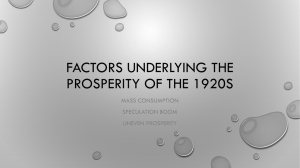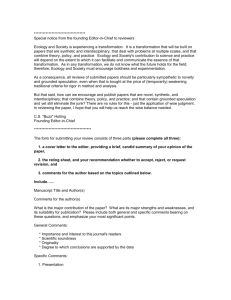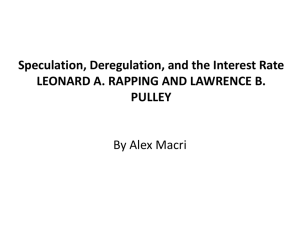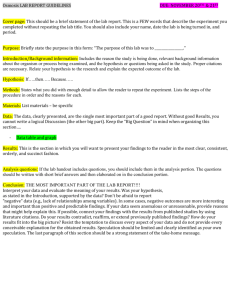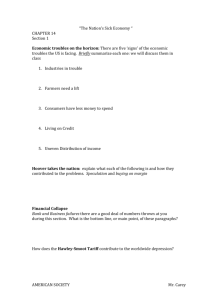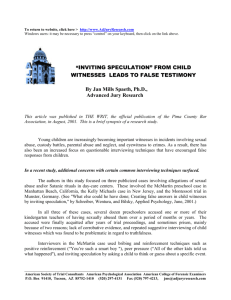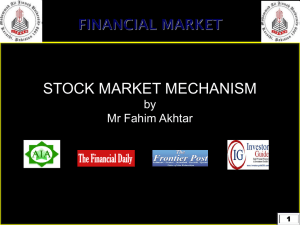Document 10457140
advertisement
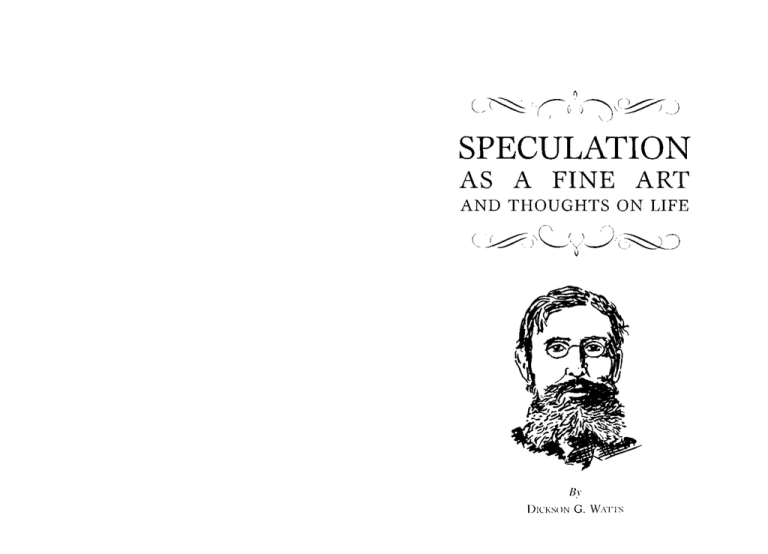
FOREWARD Copyright 1965 TRADERS PRESS New York, N.Y. You have opened the tomb of a great man. His name, his hooks and his exchange have almost vanished. Dickson G. Watts, author of SPECULATION AS A FINE A R T and THOUGHTS ON L I F E , was a charter member and President of the New York Cotton Exchange. The revival of Edwin Lefevre's book, REMINISCENCES OF A has renewed interest in the book because "Old Dickson" wrote the bible for successful speculators. Reference is constantly made of SPECULATION AS A F I N E A R T , yet there is not a copy in the Library of Congress or The New York Public Library. This was one of the few books written on speculation by a successful speculator. STOCK OPERATOR, Fraser Publishing Company Edition, 1979 2nd printing, 1985 3rd printing, 1987 4th printing, 2003 ISBN: 0-87034-056-5 Dickson G. Watts was President of The New York Cotton Exchange between 1878 and 1880. This exchange was one of the greatest arenas of speculation in America. Seats sold for as much as $45,000. At this writing, the bid is $770 and the trading ring is deserted. The epitaph of The Cotton Exchange is that our Great Society of Free Enterprise supports the price of cotton above the world market. Speculators cannot out-bid The Government, so the price cannot go up. The price cannot drop because Uncle Sam has unlimited funds. There is a remote possibility that the cotton producers will grow cotton faster than the Government can print money and the market will be free again. Pandora's Box is open. You have parts of THOUGHTS ON LIFE and SPECULATION AS A F I N E A R T in your hands. Printed in the U.S.A. Did "Old Dickson" originate the quotations and rules of speculation or did he just pass them along? At any rate, he used the knowledge to good advantage. Can you? J.R.L. 3/16/65 This reprint of a Wall Street classic is by permission of Jack R. Levien who was owner of Traders Press when it was functioning in New York. I first ran across Jack in early 1965 when he was reprinting old Wall Street classics, as we do these days, and since then I have kept track of his adventures away from Wall Street to Holland and finally back to Route 1, Box 18, McDowell, Virginia 24458 where he now resides, keeping his fertile mind working in numerous areas. One of these areas has been for years his love and care for miniature books. He has produced over 40 of them, with a great variety of subject matter, typography and bindings. In past lives, Jack was a printing salesman and later a stockbroker. He came first from Richmond, Virginia to New York and began to collect books relating to the stock market. His first miniature format was in 1967, with the results being Stock Market Manipulation by Edwin Lefevre. The results he received from publication of this small book led him to study miniature books and publish more of them. His first five miniature publications were under the Traders Press label while he lived in Brooklyn, New York. In Holland he published under his own name and he is now back in Virginia, his native land. James L. Fraser Burlington, Vermont 1979 CONTENTS Page SPECULATION AS A FINE A R T . What Is Speculation Laws Absolute Rules Conditional . . 7 LIFE 15 BUSINES 35 SOCIETY 42 LANGUAGE 44 SPECULATION AS A FINE ART WHAT IS SPECULATION? Before entering on our inquiry, before considering the rules of our art, we will examine the subject in the abstract. Is speculation right? It may be questioned, tried by the highest standards, whether any trade where an exact equivalent is not given can be right. But as society is now organized speculation seems a necessity. Is there any difference between speculation and gambling? The terms are often used interchangeably, but speculation presupposes intellectual effort; gambling, blind chance. Accurately to define the two is difficult; all definitions are difficult. Wit and humor, for instance, can be defined; but notwithstanding the most subtle distinction, wit and humor blend, run into each other. This is true of speculation and gambling. The former has some of the elements of chance; the latter some of the elements of reason. We define as best we can. Speculation is a venture based upon calculation. Gambling is a venture without calculation. The law makes this distinction; it sustains speculation and condemns gambling. All business is more or less speculation. The term speculation, however, is commonly restricted to business of exceptional uncertainty. The uninitiated believe that chance is so large a part of speculation that it is subject to no rules, is governed by no laws. [7] This is a serious error. We propose in this article to point out some of the laws in this realm. There is no royal road to success in speculation. We do not undertake, and it would be worse than folly to undertake, to show how money can be made. Those who make for themselves or others an infallible plan delude themselves and others. Our effort will be to set for the great underlying principles of the "art" the application of which must depend on circumstances, the time and the man. Let us first consider the qualities essential to the equipment of the speculator. We name them: Selfreliance, judgment, courage, prudence, pliability. 1. Self-Reliance. A man must think for himself, must follow his own convictions. George MacDonald says: "A man cannot have another man's ideas any more than he can another man's soul or another man's body." Self-trust is the foundation of successful effort. 4. Prudence. The power of measuring the danger, together with a certain alertness and watchfulness, is very important. There should be a balance of these two, Prudence and Courage; Prudence in contemplation, Courage in execution. Lord Bacon says: "In meditation all dangers should be seen; in execution one, unless very formidable." Connected with these qualities, properly an outgrowth of them, is a third, viz: promptness. The mind convinced, the act should follow. In the words of Macbeth; "Henceforth the very firstlings of my heart shall be the firstlings of my hand." Think, act, promptly. 5. Pliability the ability to change an opinion, the power of revision. "He who observes," says Emerson, "and observes again, is always formidable." 2. Judgment. That equipoise, that nice adjustment of the faculties one to the other, which is called good judgment, is an essential to the speculator. The qualifications named are necessary to the makeup of a speculator, but they must be in well-balanced combination. A deficiency or an overplus of one quality will destroy the effectiveness of all. The possession of such faculties, in a proper adjustment is, of course, uncommon. In speculation, as in life, few succeed, many fail. 3. Courage. That is, confidence to act on the decisions of the mind. In speculation there is value in Mirabeau's dictum: "Be bold, still be bold; always be bold." Each department of life has its language, expressive if not elegant, and in dealing with the subject we must perforce adopt the language of the Street. The laws given will be found to apply to speculation of any [8] [9] kind. They are universal laws; but for the sake of clearness we assume the case of speculation as conducted in one of our exchanges, where they can be best demonstrated. safety. One man told another that he could not sleep on account of his position in the market; his friend judiciously and laconically replied: "Sell down to a sleeping point." LAWS ABSOLUTE. RULES CONDITIONAL. 1. Never Overtrade. To take an interest larger than the capital justifies is to invite disaster. With such an interest a fluctuation in the market unnerves the operator, and his judgment becomes worthless. 2. Never "Double Up"; that is, never completely and at once reverse a position. Being "long," for instance, do not "sell out" and go as much "short." This may occasionally succeed, but is very hazardous, for should the market begin again to advance, the mind reverts to its original opinion and the speculator "covers up" and "goes long" again. Should this last change be wrong, complete demoralization ensues. The change in the original position should have been made moderately, cautiously, thus keeping the judgment clear and preserving the balance of the mind. These rules are subject to modification according to the circumstances, individuality and temperament of the operator. 1. It is better to "average up" than to "average down." This opinion is contrary to the one commonly held and acted upon; it being the practice to buy, and on a decline to buy more. This reduces the average. Probably four times out of five this method will result in striking a reaction in the market that will prevent loss, but the fifth time, meeting with a permanently declining market, the operator loses his head and closes out, making a heavy loss - a loss so great as to bring complete demoralization, often ruin. 4. Another rule is, when doubtful, reduce the amount of the interest; for either the mind is not satisfied with the position taken, or the interest is too large for But buying at first moderately, and, as the market advances, adding slowly and cautiously to the "line" - this is a way of speculating that requires great care and watchfulness, for the market will often (probably four times out of five) react to the point of "average." Here lies the danger. Failure to close out at the point of average destroys the safety of the whole operation. Occasionally a permanently advancing market is met with and a big profit secured. [10] [11] 3. "Run Quickly," or not at all; that is to say, act promptly at the first approach of danger, but failing to do this until others see the danger, hold on or close out part of the "interest." In such an operation the original risk is small, the danger at no time great, and when successful, the profit is large. The method should only be employed when an important advance or decline is expected, and with a moderate capital can be undertaken with comparative safety. 2. To "buy down" requires a long purse and a strong nerve, and ruin often overtakes those who have both nerve and money. The stronger the nerve the more probability of staying too long. There is, however, a class of successful operators who "buy down" and hold on. They deal in relatively small amounts. Entering the market prudently with the determination of holding on for a long period, they are not disturbed by its fluctuations. They are men of good judgment, who buy in times of depression to hold for a general revival of business - an investing rather than a speculating class. 3. In all ordinary circumstances our advice would be to buy at once an amount that is within the proper limits of capital, etc., "selling out" at a loss or profit, according to judgment. The rule is to stop losses and let profits run. If small profits are taken, then small losses must be taken. Not to have the courage to accept a loss, and to be too eager to take a profit, is fatal. It is the ruin of many. 4. Public opinion is not to be ignored. A strong speculative current is for the time being overwhelming, and should be closely watched. The rule is, to act [12] cautiously with public opinion; against it, boldly. To go with the market, even when the basis is a good one, is dangerous. It may at any time turn and rend you. Every speculator knows the danger of too much "company." It is equally necessary to exercise common caution in going against the market. This caution should be continued to the point of wavering - of loss of confidence - when the market should be boldly encountered to the full extent of strength, nerve and capital. The market has a pulse on which the hand of the operator should be placed as that of the physician on the wrist of the patient. This pulse-beat must be the guide when and how to act. 5. Quiet, weak markets are good markets to sell. They ordinarily develop into declining markets. But when a market has gone through the stages of quiet and weak to active and declining, then on to semi-panic or panic, it should be bought freely. When vice versa, a quiet and firm market develops into activity and strength, then into excitement, it should be sold with great confidence. 6. In forming an opinion of the market, the element of chance ought not be omitted. There is a doctrine of chances - Napoleon in his campaigns allowed a margin for chance - for the accidents that come in to destroy or modify the best calculation. Calculation must measure the incalculable. In the "reproof of chance lies the true proof of men." It is better to act on general than special information [13] (it is not so misleading), viz., the state of the country, the condition of the crops, manufacturers, etc. Statistics are valuable, hut they must be kept subordinate to a comprehensive view of the whole situation. Those who confine themselves too closely to statistics are poor guides. "There is nothing," said Canning, "so fallacious as facts, except figures." "When in doubt, do nothing. Don't enter the market on half convictions; wait till the convictions are fully matured." We have written to little purpose unless we have left the impression that the fundamental principle that lies at the base of all speculation is this: Act so as to keep the mind clear, its judgment trustworthy. A reserve force should therefore be maintained and kept for supreme movements, when the full strength of the whole man should be put on the stroke delivered. It may be thought that the carrying out of these rules is difficult. As we said in the outset, the gifted man only can apply them. To the artist alone are the rules of his art valuable. LIFE Compensations do not always compensate. A common deception, — self-deception. Hold in time, or take the jump. A danger known is half overcome. A fault recognized is half conquered. A great insult, — tell a man he can't take a joke. Fools try to prove that they are right. Wise men try to find when they are wrong. That writer is the greatest who says the least and suggests the most. Follow the vague and intangible, and it will become definite and tangible. A man's good qualities are often, at bottom, only pride. Two standards, — one for yourself and one for your neighbor. The first should be fixed, the second flexible. [14] [15] That man is greatest who quickens most the lives of other men. Catch thoughts "on the fly," for there is no rebound. To conquer fate, advance to meet it. All see; few observe, fewer still compare. The first blow is half the battle. The finished fabric of science is the raw material of philosophy. Destruction must often precede construction, but most men stop at the former. Man's enemies are legion. Ofttimes he himself is his only friend. Surplus is as bad as deficiency, deficiency as surplus. Common sense is sense men have in common. Defer to a man and he will listen to you. Sentimentality is an ugly caricature of beautiful sentiment. The dangerous classes, — enthusiasts and fools. Nerve is nerves controlled. A true estimate of one's self is not vanity. Many lean, few lift. Suffering of the body is pain, of the mind anguish, of the spirit agony. Imagination controlled is a great builder; imagination uncontrolled, a great destroyer. Man can improve on nature. Perhaps that is his business here. People forget in the rush, remember in the hush. The distant is the great, the near the little. But the little-near controls man rather than the distantgreat. [16] Look before you leap, but not when you leap. The greatest tolerance is to tolerate the intolerant. [17] Among crazy people, a sane man is thought a lunatic. Awe is fear petrified. A blemish in youth, a vice in old age. To the careless, life is a drama; to the heartless, a comedy; to the thoughtful, a tragedy. Nothing so formidable as knowledge — except ignorance. Great wealth is a misfortune; it attracts parasites and repels friends. Health is equilibrium. The man who conforms never transforms. Nothing so impressive as simplicity. Incongruity is the basis of humor; inconsistency, a source of wit. The world is full of commonplace people. The query is, What becomes of the "phenomenal children?" Respect your limitations; you limitations will not respect you. Wealth is a good inheritance, but a sound stomach is a better. Man fears the unknown, despises the uncomprehended. Tiresome people are interesting — to themselves. People meditate much — on other people's sins. Sleep is a truce, death a surrender. "Up to the limit," but not beyond the limit. The man who makes a positive assertion is — positively wrong. Put on the brakes in middle life, or the momentum of youth will destroy you. Every man is distinguished (distinct from others) if he would be natural. Vehemence is a sign of weakness; quietness is a sign of strength. Better the vagaries of eccentricity than commonplace dullness. [18] [19] The man who "knows it all" has much to learn. Light is one; and yet people see things in "a different light." It is shadow that makes the difference. The test of a man is what he is in an emergency. Don't fool with Nature; she "strikes back." To separate the essential from the non-essential is the mark of a superior mind. People, like gems, have flaws. If we would enjoy them we should not examine too closely. In his secret heart, every man thinks the universe is especially hard on him. If all men were geniuses, there would be no genius. Break antagonism with a joke. Recognize a fault, but don't dwell on it. Enthusiasm is a poor guide, but a good companion. A prophet is without honor — the first time he makes a mistake. Don't stand shivering on the brink; take the plunge. Genius consists of seeing instantly the vital point. Every man is a secret; his friends, those who guess a part of the riddle. The more points of view, the better the point of view. Morals and money, — either alone is a great power; together they are omnipotent. Don't batter down the door; pick the lock. [20] Habit is the tyrant of man; inheritance, the tyrant of the race. The peace of ignorance; the serenity of knowledge. Censure is poor food, but we can extract some nourishment from it. All movements are in waves, — in politics, in business, in the atmosphere, in spirit. Rest with [21] descending wave. wave; mount with the ascending None so blind as those who are sure they see. At thirty, most men are in a condition of arrested development. A few grow until their bodies fall into the grave. Wealth is a means of refinement; but having done its work it ceases to aid, and retards true refinement. One moment man may soar through space; another, grovel in the dust. If a horse knew his strength, no man could drive him. If man knew his power, the universe could hardly contain him. Sickness develops a man inwardly, health outwardly. To have the benefits of both, man must have been sick and become well. Much power, like much learning, makes men mad. In youth a man forges the chains that bind him in old age. The man who rides a "high horse" forgets how things look to people on foot. Seeing things in their right relation to each other is the highest vision. A great man changes the map of the earth; a great idea, the map of the stars. Teach men to navigate life's sea as you teach a boy to swim; put your hand under him, then slowly and gently withdraw it. A philosopher doesn't win battles, found empires; but reclaims new territory and civilizes old hemispheres. Nothing so dear to a man as his money — except his prejudice. Desire for superiority is universal. If a man be a knave, he wishes to be the greatest knave; if a fool, the biggest fool. The voice may speak false, but the eye always tells. [22] Man rules man; ideas rules the world. [23] The realist makes the mistake of exposing everything. It isn't necessary to go through the kitchen to reach the parlor. Take counsel on your fears, but don't be controlled by them. Acquire a habit and a habit has acquired you. A man who does not change his mind has little mind to change. The enthusiastic man is an iconoclast; the vain man, a fool. Pleasure and pain are the two poles of consciousness; they make the circuit complete. The man with a grievance is not "acquainted with grief." "There is many a slip between the cup and the lip," but only one slip between the cup and the ground. Get on a train of cars and you will go to your destination. Get on a train of thought and you will go — where? Capacity for suffering is in exact proportion to capacity for enjoyment. One half of the world commits suicide; the other half is murdered. All men travel in circles. A few increase the diameter of the circle. Some people lie and never deceive; other speak truth and always deceive. Angels abroad are often demons at home. "Misery loves company," but "company" doesn't reciprocate. A strong personality arouses antagonisms. A pronounced individuality removes barriers. Money covers a multitude of sins. [24] Administer correction with a joke, and it will go down like a sugar-coated pill. The man who does not laugh at himself, despise himself, and worship himself, knows nothing about himself. [25] "Tools to those who can use them," words to those who can understand them. A friend is one with whom we can think out loud. In the presence of some people we wither like sensitive-plants; in the presence of others, we expand like flowers. People who wish to do; people who wish to know; people who wish to see; people who wish to dream, — the first are statesmen; the second, philosophers; the third are artists; the last are poets. Man is his own court; his own judge, and his own executioner. Wealth is first a means and then a barrier to refinement. A good second-hand article, — experience. At twenty, and again at sixty, a man "knows it all." Many disappointments, but the man who is "spoiling for a fight" gets what he is looking for. Don't look at your friends through a microscope, nor at yourself through a telescope. Wise men sometimes say foolish things. Fools sometimes say wise things. "Great bodies move slowly." Great events move rapidly. Destroy the illusions and there is not much left of life. Sarcasm is the spawn of meanness; joking, the offspring of good-nature. Men make large demands on the universe, but they offer little in payment. Many men have the "courage of their opinions," few the courage to abandon their opinions. Some people think; others think they think. [26] The unpardonable sin, — not to make money. Many a truth spoken in jest; many an untruth spoken in earnest. The sorrows of youth are acute; of age bitter. Stagnation is damnation. Circulation is salvation. [27] To have made one's self ridiculous, and not to mourn over it, is a supreme test of virtue. Blame, when praise is deserved, exasperates; praise, when blame is deserved, humiliates. Most men absorb the atmosphere they are in. A few create their own atmosphere. Do you wish sympathy? Don't seek it. Patience is sustained courage. If you wait until you see clearly, you will never act; if you wait for a pure motive, you will never move. Virtue is its own reward; so is vice. A wise man laughs at his own follies. To be sincere with others is easy; with one's self, difficult. To be called a knave is sometimes forgiven; to be called a fool, never. Use condition's possession. You must use your body or lose it; use your mind or lose it; use your soul or lose it. Never explain. Let your life be the explanation. Recognition is the greatest honor man can bestow on man; condescension, the greatest insult. [28] If you know, you have already fallen in error. A fool often condescends to a fool. "Whatever is, is" wrong, and needs to be changed, arbitrarily or by evolution. "The destruction of the poor is their poverty." The destruction of the rich is the riches. The greatest possession, — self-possession. Shyness is vanity turned inward. The want of sympathy shows us how sweet sympathy is. In life, as in a game of cards, you must sit out bad luck. Tradition is the hereditary disease of the race. [29] Man seldom wishes advice; he wishes to be confirmed in his own opinion. Advice is cheap. That is the reason there is so much of it. Tyranny is the vice of a brutal man; submission to it, the vice of a timid man. "Sweet are the uses of adversity" — if adversity does not last too long. Tendency is everything. The direction in which you start determines your destination. Wisdom consists of seeing many things and concentrating on one thing. Never do to-day what you can as well do to-morrow. The wisdom of to-morrow is better than that of to-day. You must make your own acquaintance in some world; better begin in this one. If you want to go anywhere, start. If you want to do anything, begin. Some authors are apart from their work; others, a part of their work. The former we admire; the latter we love. A man who has made a mistake suffers enough. Don't "throw it up" to him. We cannot be just and hold the scales ourselves. Two kinds of wisdom, — to persist in things worth doing; to abandon things not worth doing. Keep your voice down and you will keep your temper down. Courage consists in doing the thing you are afraid to do. The wound that injustice makes goes deeper and lasts longer than any other. To advise is to claim superiority and is resented, unless the superiority is admitted. Teach by indirection rather than by direction; by suggestion, rather than instruction. Dislike is sometimes based upon understanding; oftener, on misunderstanding. [30] [31] A good man thinks the motives of others are as pure as his own. A bad man thinks the motive of others are as bad as his own. Life often corrects the mistake of the former, seldom those of the latter. Life is a dream. Some men know they are dreaming; others think they are awake. All things demand an outlet. The passageway of the body stopped, death ensues; the mind, inverted, stagnates; the soul, denied expression, stifles. Two kinds of vision, — to see things as we see them; to see things as others see them. "The dreamer" is a man who lives in advance of his time. Men wish to die when they should live; wish to live when they should die. When in adversity, don't speak of it; you will make others unhappy. When in prosperity, don't speak of it; you will also make others unhappy. Some men are alive after they are dead; others are dead while still alive. Argument is an effort of each man to force his idea [32] on the other; discussion is an effort to gain knowledge. The wise man declines argument, invites discussion. The whole truth cannot be stated in any one proposition. Do you want a secret kept? Don't tell it. A true view can only be gained by having been in a thing and having come out of it. Two kinds of truth, — abstract and practical. Practical truth is as much of the abstract truth as can be applied at any given time. Eating, drinking, and sleeping are the penalties the soul pays for inhabiting a body. Man begins in simplicity, advances to complexity, returns to simplicity. The last is complexity reduced to the fewer terms. Society follows the same course. It is now in the complex stage. Bodily and mental attitude should correspond. When receiving correction, sit down; when administering it, stand up. To know when to begin is easy; when to stop, difficult. [33] Vanity struggles long and dies hard. Bragging is an expensive luxury. Better not indulge in it. Nothing so sad as the laughter that hides a broken heart. People who live on the surface live long. People who live in the depths live much. There will be many Methuselahs when man shall have magnified his spiritual power to a maximum, and reduced his physical wants to a minimum. Old young men are invariably wicked; young old men, universally good. If you work yourself down, sleep yourself up. BUSINESS TAKE short views. If you shoot at a near mark, even if your hand shakes you will hit it. If you shoot at a distant mark, and your hand vibrates slightly, you will miss it. When danger threatens, don't stand like a sheep; run like a deer. Imagination is as great a power in business as it is in art, in literature, or in religion. Make your theories fit your facts, not your facts your theories. Don't storm the fortress of fortune; lay siege to it. Opportunities are always there, but the opportunist is lacking. Imagination makes cowards of us all. Stubborn men don't live long — financially. The rich have few friends; the poor, no enemies. Placing emphasis in the right place is the truest art and the highest wisdom. In practical affairs the "personal equation" is not sufficiently taken into the account. Trust your impulses; they are often a higher reason. [34] [35] The foolishness of the many is the opportunity of the few. The man who thinks right will gain much. The man who thinks quick and right has the world in a sling. The success of one is the failure of a hundred. The more "hindsight" the better foresight. It is always the "unlucky man" who believes in luck. Not the knowledge of facts, but the interpretation of facts differentiates the successful from the unsuccessful man. A "plausible" man deals in everything except facts. Seeing things too soon is as bad as seeing things too late. Act on the temporary; the temporary may become the permanent. Luck, the destruction of the weak, is overcome by the strong. Luck exists. But the able man acts so as to minimize bad luck and augment good luck. Take care of the losses; the profits will take care of themselves. Not how much can you make, but how much can you lose. Eternal vigilance is the price of — success. Reject green wood, raw men, and new enterprises; wait until they are seasoned. Better make "new" money than to go to law to collect an "old" debt. Business is a kaleidoscope, continually changing and forming new combinations. Take a fresh look every day. Beware of the "unfortunate" man; flee from the enthusiastic man. "A sure thing" is a dangerous thing. [36] Better capital in a man's head than capital in a bank. [37] Look after the principal; the interest will look after itself. In the business world, as in the physical and moral world, plasticity is life, rigidity is death. To be "too greedy" is as bad in business as in morals. Learn principles. Facts will then fall into their relations and connections. Quick decisions are the best decisions. When you begin to doubt, begin to "get out." Thought and act should be hyphened. If a speculation keeps you awake at night, sell down to the sleeping point. MEN SOME men are so mellow that they are rotten. Little men talk of people; great men, of things. The self-important man is seldom important to others. No man is as good as he is thought to be; no man as bad. A tiresome man, — a man with a theory. Money adds nothing to an extraordinary man, but it is the "saving grace" of an ordinary man. The able man compares himself with the known and is proud. The great man compares himself with the unknown and is humble. The vain man is laughable; the proud man is insufferable. An able man disdains the wisdom of other men; a great man uses the wisdom of other men. [38] [39] Two kinds of men, — men who see things as they are, and men who see things as they ought to be. The former are practical, the latter reformers. The wise man accepts the position of the former, and works to accomplish that of the latter. Against flattery women are on guard. Men can be flattered into doing almost anything. Men excuse their vices by enumerating their virtues. The great man is little, the little man great. The difference between them lies in that the great man knows his littleness, but the little man does not comprehend his greatness. Many men have the "courage of their opinions," few the courage to abandon opinions. A real man has no "appearances" to "keep up." The man who stands on his dignity has nothing else to stand on. The "self-made man" is proud of a very poor job. Strong men are silent. When a strong man begins to talk, he is losing his power. The talented man must live to be appreciated. The genius must die to be appreciated. The little man demands to be understood; the great man is content to be misunderstood. The most complete man is he who touches life at the most points. The man who talks of his grand acquaintances is never a grand man. The man who monopolizes the conversation has a monopoly himself. Some men are icebergs, — they never had any heat; others are burned-out volcanoes, — only the ashes remain. The mistake of an able man is that he thinks others are as able as he. Men who go straight to the point either see very little or see very much. [40] [41] SOCIETY "Make believe" is a game society plays as well as children. THE least "manner" the best manners. Better talk good sense than good English. Second-class people, — those just below us. Public opinion is the scarecrow of society. The Hobgoblin of Society, — "What people will say• ? " Society people order their clothes, but get their opinions "ready made." The world is not deceived; it distinguishes between that which is "put on" from that which grows on. What sap is to the tree, blood to man, money is to society. Men wear masks and the world takes them seriously; when a man shows his real face, the world laughs. Nondescripts, — "nice people." Disturbers of society, — people who are aggressively intellectual, and people who have prominent consciences. Man seeks society because he can't endure his own companionship. Society is one organism. Life the race and the individual is lifted. Life the individual and the race is lifted. [42] [43] LANGUAGE LANGUAGE is an evolution, and has its roots in the ground. Words are counters in the game of life. Use them carefully; they must be redeemed. Words burn like fire and heat like balm. Words are coins. Stamp them with your own image. The language of sorrow is tears; the language of despair, silence. There is a language of science, a language of diplomacy, a language of commerce, a language of spirit. To understand a man, you must know the language spoken. A word in times saves nine. Thoughts are vitalized blood. We can say things we can't write; write things we can't say. Brevity is the soul of — language. To know when to speak is rare; when to be silent, rarer still. Not what others have written, but what you think. [44] THE END!!!
